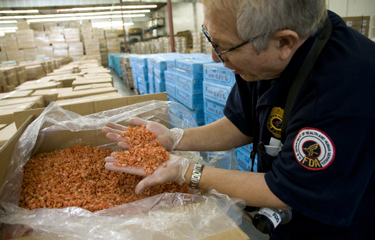FDA rejects historically low seafood imports in July

The U.S. Food and Drug Administration (FDA) refused only 37 seafood entry lines in July, continuing a trend where federal officials were rejecting a historically low number of products.
According to the Southern Shrimp Alliance, that amount is by far a record low for the month. It’s only 21.3 percent of this historical average the alliance has tracked since 2002. It’s also significantly lower than the previous record low of 91 entry lines, which occurred last year.
In a statement, the SSA said the drop in refused entry lines since May “staggering.” From May to July, just 101 entry lines were denied, more than a 50 percent decline off the previous record low, which was 242 last year.
Before 2019, the previous record was 376 set in 2014.
“This remarkable decline in overall seafood entry line refusals implies a massive reduction in the FDA’s oversight activities regarding imported seafood at our ports of entry,” the alliance said in a statement.
In July, only three of the refused entry lines were for shrimp containing banned antibiotics. One of the rejects originated from Phatthana Frozen Food Co. Ltd. in Thailand. That marked the first denial of a Thai shrimp import since May 2017, according to the alliance.
Through the first seven months of 2020, the FDA has denied only 18 shrimp entry lines. That’s putting it on a pace for the fewest shrimp rejections for the year since 2006, when the FDA turned back just 26 entry lines. Last year, officials denied 61 line entries.
The Shrimp Alliance has been pushing for more inspections of imported shrimp, claiming producers from Asia flood the U.S. market with cheaply produced products that make it hard for Gulf shrimpers to compete. The group also has raised concerns about the amount of illegal antibiotics importers use, saying that it poses a threat to consumers’ health, and over issues of forced labor in foreign supply chains.
Photo courtesy of U.S. Food and Drug Administration






Share